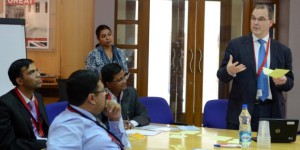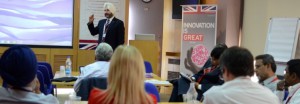11th December 2015 New Delhi, India
Post Harvest Technologies – New Ties – UK and India
The end of November saw the much anticipated launch of a joint funding call on Agri-Food. This call is funded by Newton-Bhabha – our five year £50 million joint programme with India. Under Newton-Bhabha, Innovate UK, the UK Research Councils and India’s Department of Biotechnology (DBT) plan to invest £10 million on developing joint industrial R&D projects. This joint call proposes to tackle key challenges existing at the post-harvest stage in India’s agri-food sector. Why is this important?
Looking for solutions to the issue of Post Harvest Losses (PHL) has the potential to increase the efficiency of the whole food chain in India and the UK. Creating an integrated approach to the food chain has wider impacts at a time of increasing global demand for food and energy.
The scope of this joint call involved consultations with experts from both countries. SIN organised a number of these interactions with site visits, roundtables and a recent workshop of UK and Indian agri-tech experts in 2015 resulting in Innovate UK, RCUK and DBT framing this joint call through expert advice.
 One of such visits was recently organised by us around a month back in October. The visit of a seven member UK delegation was organised by SIN working closely with Innovate UK’s Knowledge Transfer Network. This visit was primarily based on the recommendations from last year’s India wide visit by UK experts. I thoroughly enjoyed organising the visit programme for this delegation, which had varied elements including a workshop, interaction with India’s experts from the area of cold chain as well as visit to Mother Dairy’s plant in West Delhi.
One of such visits was recently organised by us around a month back in October. The visit of a seven member UK delegation was organised by SIN working closely with Innovate UK’s Knowledge Transfer Network. This visit was primarily based on the recommendations from last year’s India wide visit by UK experts. I thoroughly enjoyed organising the visit programme for this delegation, which had varied elements including a workshop, interaction with India’s experts from the area of cold chain as well as visit to Mother Dairy’s plant in West Delhi.
 The day long workshop had attendees from academia, industry as well as officials from the DBT and the India’s Ministry of Food Processing Industries actively brainstorming on the key challenges in this area and ways to tackle these. Meeting with Kohli from the National Centre for Cold Chain Development as well as attending a seminar on ‘Logistics and Supply Chain Efficiency’ in Mumbai provided the delegates with a deep insight into this critical aspect of food processing. The visit to Mother Diary’s plant ended this visit programme on a brilliant note. The operations as showcased in the plant by their very competent team were indicative of India’s stronghold in the dairy sector.
The day long workshop had attendees from academia, industry as well as officials from the DBT and the India’s Ministry of Food Processing Industries actively brainstorming on the key challenges in this area and ways to tackle these. Meeting with Kohli from the National Centre for Cold Chain Development as well as attending a seminar on ‘Logistics and Supply Chain Efficiency’ in Mumbai provided the delegates with a deep insight into this critical aspect of food processing. The visit to Mother Diary’s plant ended this visit programme on a brilliant note. The operations as showcased in the plant by their very competent team were indicative of India’s stronghold in the dairy sector.
Some important dates to keep in mind – The deadline for the first stage applications for the funding call is at noon UK time on 27 January 2016. Registration is required to enter this competition. Applicants must register by noon on 20 January 2016, one week before the application deadline. I have also been informed that KTN has organised a partnering webinar for potential applicants on 11th of this month. This will provide an opportunity for Indian and UK participants interested in this competition to meet and develop collaborative partnerships.
In a world with limited natural resources and where innovative solutions are to be found to produce enough safe and nutritious food for all, reducing food losses needs to obtain high priority. The launch of this initiative has kick started an exciting partnership between UK and India which could make a significant contribution in doing so.